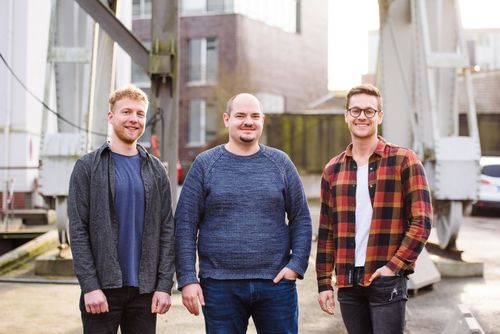Since the beginning of 2020, Startup Plancraft has received the EXIST start-up grant from the Federal Ministry of Economics and Energy (BMWi). Editor Laura Steinau met with Julian Wiedenhaus for an interview.
The right tool for craftsmen: That is what Plancraft delivers. Behind the startup is the three-man founding team Alexander, Richard & Julian. Together they combine knowledge from the fields of craftsmanship, software, business and civil engineering. Since the beginning of 2020, the team has received the EXIST start-up grant from the Federal Ministry of Economics and Energy (BMWi). The founders work in an office in our start-up centre in Harburg. We met with Julian for an interview.
How did you get the idea for Plancraft?
The idea was born in 2018. Alex’s father has a carpentry shop with almost 25 employees. Everyone there was dissatisfied with the order processing software. It was far too complicated, technologically outdated and therefore restrictive and slow. Alex then looked for new software, did a lot of research and finally found a solution. After the costly conversion and a four-digit license fee, it was clear that the desired added value would not be achieved. The software was just as bad and complexly implemented, with the only difference that it was not from 1998 but from 2010. The whole thing was then abandoned and Alex had recognized the potential of an innovative software. He brought me on board. Based on the Lean Startup Playbook, which we knew from our studies, we then conducted interviews with other companies from the network and found that there are a lot of construction sites in this area. We took a lot of ideas with us and spent half a year developing a concept together with Richard, so we slowly approached the idea we are pursuing today.
And what exactly does the idea look like?
Our flexible web app simplifies order processing for craftsmen. Every craftsman can get started quickly with the application, onboarding is easy, the user experience is unique. The SaaS solution is very intuitive and supports the user with an intelligent search to quickly create documents. At the same time the software has the flexibility of a cloud application and is platform independent. And all this without any complicated installation or annoying updates. And it runs even when the Internet is not available.
Later, we also want to move towards machine learning support, and that companies can share all documents on one platform when working on construction projects. That’s dreams of the future, but that’s where we want to go.
Can you describe in more detail what problem you are solving with this?
Craftsmen are chronically overworked, the order books are bursting.
The problem is that master craftsmen and managing directors are additionally bound to order processing. They have to write technically correct offers for customers, calculate measurements and overview orders. Today’s solutions are either old-fashioned software that needs its own servers. Or poorly implemented webapps that promise improvement but are just as complex, specialized and ultimately overtaxing for the craftsman. Plancraft is the first PGA (Progressive WebApp) to set new standards in terms of UX, focused features and intuitive usability. In order to ensure this, we have been working together with craftsmen since our foundation to develop solutions that are easy to understand and simple. Whether carpentry with 25 employees, carpenters with five or one-man drywallers – diversity helps our product.
What made you personally decide to found a start-up?
I had taken time off from my work at Airbus to study for a master’s degree, which was not dual. In an entrepreneurship module I gained my first start-up experience in a project with Alex. While I was studying, I did student consulting at Hanseatic Consulting, where I also had contact with startups. I found these agile ways of working inspiring, something I didn’t know from life in a large corporation, something I really wanted to do – this is my fulfilling career path. After my master’s degree, I worked at Airbus for a whole year, developing Plancraft at the same time, and since the end of 2019 I have been doing this full-time. Since then, we have all been able to live the credo “No more mondays” – it’s simply fun to help a neglected target group like craftsmen.
Then we wish you good luck with plancraft.de and thank you very much for the interview, Julian!
Background
Alexander Noll (26): Alex holds a bachelor’s degree in civil engineering from the Technical University of Hamburg (TUHH). At the same time he trained as an energy expert on the Elbe campus. He also completed his Master’s degree in International Business and Engineering at the TUHH and graduated in 2019. During his studies, he already dealt with software development, continued his education autodidactically and accepted student trainee positions as a developer. During one of these jobs he then got to know Richard at Etventure, a subsidiary of the consulting company Ernst & Young. Alex has the Handwerk-Connection, because his father owns the carpentry Noll in Tostedt near Hamburg, where Alex grew up.
Richard Keil (35): Richard was Alex’ mentor at Etventure. He is the IT expert in the team, started with an IT specialist training and gained many years of professional experience in the areas of web design/web development in agencies, corporate startups and consulting. As a full stack developer (meaning he can program frontend and backend) he has been working full time at Plancraft since the end of 2019, just like the others. Richard was born in Munich.
Julian Wiedenhaus (27): Julian is a trained mechanical engineer. In the form of a dual course of studies at Airbus in Bremen, he completed both an apprenticeship as an aircraft mechanic and a Bachelor of Engineering at the Bremen University of Applied Sciences. Like his co-founder and fellow student Alex, he completed his Master’s degree in International Business and Engineering at the TUHH and graduated in 2018. Parallel to Plancraft, Julian worked as a project manager at Airbus until 2019. He comes from Bielefeld.

